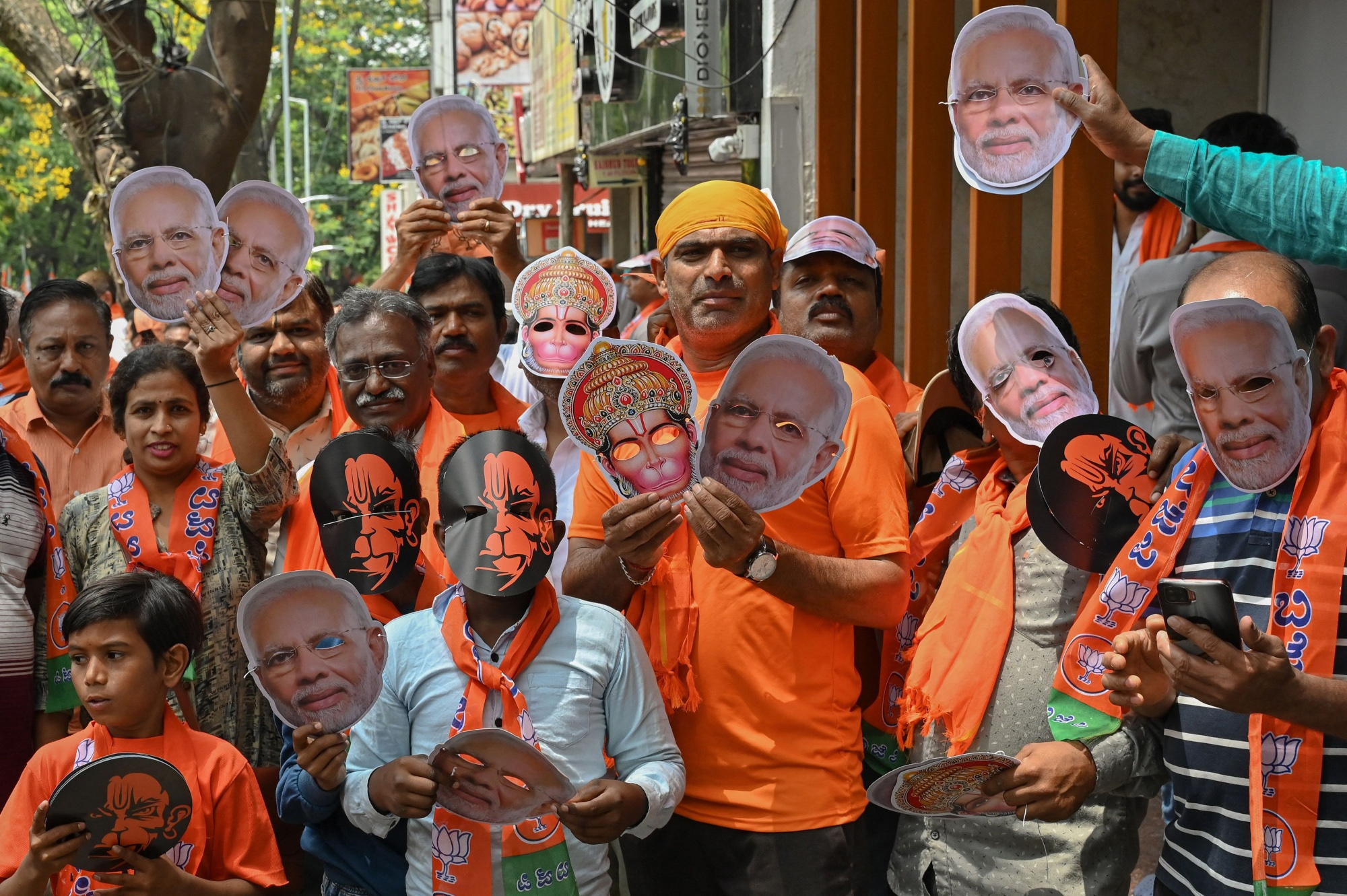Modi aims to eclipse the harsh realities of mounting unemployment, economic disparity and social turmoil within the nation
 KRC TIMES Desk
KRC TIMES Desk

Nilantha Ilangamuwa
By rejecting divisive politics and reducing the BJP’s dominance, voters have endorsed a new era of coalition politics favouring regional and smaller parties
The outcomes of the recently concluded Indian Lok Sabha elections signal promise for the region, prompting nations to reconsider and reassess their democratic political frameworks. In a resounding declaration of democracy’s resilience, the once seemingly invincible fortress of the Modi-Ka Parivar lies shattered.
The echoes of this strong message from the public reverberate louder than the emotional sensationalism, resonating with the collective voice of a nation that has spoken unequivocally for the power of balance. Despite the relentless onslaught of propaganda and fervent efforts to manufacture public opinion, the Indian electorate has delivered a decisive blow, reclaiming their power and rejecting the facade of religious fervour masquerading as governance.
Narendra Modi, the erstwhile political juggernaut, now stands at the precipice of his last tenure, his aspirations of perpetual rule dashed against the rocks of reality. His grandiose ambitions of global dominion and spiritual leadership lie in tatters, mere relics of a bygone era marked by hubris and delusion.
The BJP’s significant loss, laid bare in the aftermath of the election, paints a stark portrait of defeat. With 92 seats lost out of their previous 303, including once impregnable strongholds in rural heartlands and urban bastions like Mumbai, the party finds itself relegated to the sidelines of political discourse.
The myth of invincibility shattered, the BJP stands exposed, its veneer of infallibility stripped away to reveal the inherent flaws and fallacies of its governance model. The result also exposes the impact of heavy spending on AI-driven social media manipulation.

Government agencies outspent political parties on Google ads leading up to India’s national elections, with the BJP ranking second. This stark contrast in spending highlights the influence of advertising in shaping democratic norms, serving as a stark reminder of democracy’s vulnerability to manipulation.
Yet amidst the debris of defeat lies the triumph of democracy. The people have spoken, their voices resonating with clarity and conviction, reaffirming their allegiance not to religious ideologies or cults of personality, but to the principles of democracy and secular governance. This electoral upheaval serves as a clarion call for change, a witness to the indomitable spirit of a nation that refuses to be swayed by divisive verbiage or empty promises.
As the dust settles on the frontline of Indian politics, the narrative of triumph and victory spun by the BJP and its leader Narendra Modi stands starkly contrasted against the reality of their electoral performance. Despite Modi’s impassioned spiel and grandiose claims of India’s newfound global prominence, the truth remains irrefutable: the BJP’s grip on power has weakened, its once impregnable fortress breached by the resolute will of the Indian electorate.
The BJP’s electoral arithmetic, touted as proof of its enduring popularity, belies a deeper truth of diminishing returns and waning support. While the party managed to retain a significant portion of its 2019 tally, the loss of 92 seats, coupled with the failure to secure the predicted landslide victory, exposes the chinks in its armour and the vulnerabilities lurking beneath the surface of its facade.
Modi’s campaign discourse has taken a sharp turn towards foreign affairs and diplomacy, perhaps as a tactic to deflect attention from his administration’s domestic shortcomings. By emphasizing India’s global ascendancy and economic strength, Modi aims to eclipse the harsh realities of mounting unemployment, economic disparity and social turmoil within the nation.
Amidst his grandiose assertions of India’s international accomplishments, including hosting global summits and economic growth, Modi’s narrative conveniently obscures governance failures and policy deficiencies. Despite his celebrations of India’s elevated global standing, the everyday struggles of citizens remain overshadowed by political oratory, highlighting a growing disparity between political narratives and lived experiences.
Facing electoral setbacks and a reduced mandate, Modi and the BJP confront a populace increasingly demanding accountability and change. The rejection of empty promises signals a call for transparent, people-centric governance, underscoring the need for a political shift away from complacency towards accountability.
Modi’s foreign policy rhetoric aligns with his domestic agenda, framing a narrative of “us-vs.-them” and emphasizing resolve against perceived threats like Pakistan and China, particularly in combating terrorism. Despite clashes with Pakistan and the 2020 China confrontation showcased as symbols of national strength, critics challenge Modi’s response to Chinese aggression, while BJP members rally behind his assertive stance.
Yet, beneath this facade, lie intricate geopolitical complexities and diplomatic hurdles. India’s navigation among global powers demands a nuanced approach, prioritizing national interests amidst turbulent international dynamics.
Accusations against the BJP for prioritising foreign affairs over domestic concerns challenge Modi’s nationalist narrative, despite his claims of India’s global ascendancy. Opposition voices condemn the party’s erosion of democratic norms, yet Modi’s firm stance resonates with many voters, reflecting a desire for a stronger international presence.

However, mounting criticism of the BJP’s handling of issues like inflation and unemployment casts doubt on its commitment to democracy. Recent electoral setbacks, notably in Uttar Pradesh, reveal deep-seated discontent, with opposition framing the BJP’s governance as a threat to constitutional rights, leading to disillusionment among both critics and former supporters.
The symbolism of Ayodhya, from the demolition of the Babri mosque in 1992 to the consecration of the Ram temple in 2021, epitomizes the BJP’s journey to power and its subsequent challenges. While Modi’s imprint on Varanasi is undeniable, with infrastructure development projects transforming the city’s landscape, the cost of progress has been the erosion of its unique identity, lamented by many locals.
The electoral panorama in Uttar Pradesh unveils a complex interplay of shifting loyalties and deep-rooted grievances, particularly within marginalized communities such as the Dalits. Despite Modi’s enduring popularity, evidenced by his victory in Varanasi albeit with a notably reduced margin, the BJP’s electoral fortunes have been tempered by various concerns, notably regarding constitutional rights and social equity
The BJP’s ambitious electoral slogan, promising an overwhelming triumph, stirred apprehensions among the Dalit populace, raising fears of potential amendments to the constitution.
This apprehension, as the media reports asserted, stemming from the fear of diluting protections advocated by Bhimrao Ambedkar, prompted numerous Dalit voters to align with the opposition INDIA alliance, which adeptly mobilised a coalition of marginalised groups.
Modi’s language targeting Muslims as “infiltrators” further galvanised opposition to the BJP, particularly among Dalit and Muslim communities, despite the party’s efforts to allay Dalit fears and disavow any intentions of rescinding their constitutional privileges. The electoral terrain in Uttar Pradesh reflects a shifting paradigm, with marginalized communities asserting their voices and demanding accountability from political incumbents.
The narrative of disillusionment and disenchantment highlights the intricate nature of Indian politics and the hurdles confronting the BJP as it navigates the evolving currents of public opinion. Despite facing electoral setbacks, the BJP remains a potent political force, positioned to forge the next government alongside its allies.
However, the undercurrents of discontent and unmet assurances could potentially influence the trajectory of Indian politics in the years ahead. The resounding voice of the nation echoes: it’s now up to the government, poised to lead for the next five years, to heed the lessons of tolerance spoken by the populace of the world’s most populous country.
(The writer is a Sri Lankan journalist and author; Views are personal)


